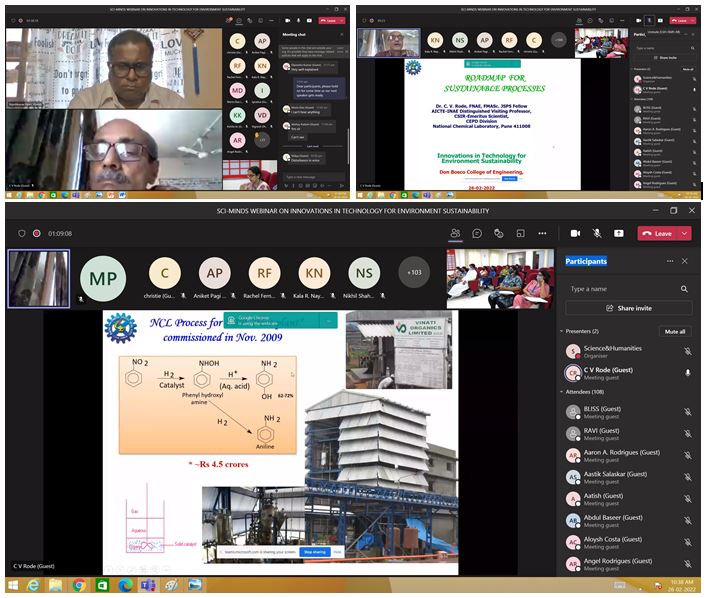Report on the Second Sci-Minds Web Series

The Department of Science and Humanities of Don Bosco College of Engineering (DBCE), Fatorda held its second Sci-Minds web series on Innovations in Technology for Environment Sustainability on 26 February 2022 through Microsoft teams. The event coordinators Mrs. Gladys Da Silva and Mr. Harison Cota collaborated with Dr. C. V. Rode and Dr. Rajesh Kumar Shankar Hyam to bring together an excellent session that ignited the minds of researchers and students from among the participants.
Those present in the audience included Rev. Fr. Kinley D’Cruz – Director, (DBCE), Dr. Neena Panadikar – Principal, (DBCE) and Dr. Kala Nayak, Registrar and Head, Department of Science & Humanities.
Ms. Steefni Cruz welcomed the participants and gave the overview of Sci-minds, this was followed by a short video of the college.
The first Session was on Chemo and Bio Catalytic Avenues for BioRefinery by Dr. C. V. Rode Emeritus Scientist Chemical Engineering & Process Development, CSIR-National Chemical Laboratory Pune; he was introduced by Mrs. Gladys Da Silva.
Dr. Rode stated “Crude oil is a diminishing feed stock, and a step forward towards achieving sustainability and reduction in carbon footprints is the realization of BioRefinery concept, using renewable biomass feedstock for producing biofuels and chemicals”. He further stated that BioRefining is still largely unexplored territory and presents unique challenges as the bio derived molecules contain more than one oxygen atom.
His talk highlighted the recent work on heterogeneous catalysts and process development for (i) bio- glycerol valorization to C3/ C2 diols and propanol, glycerol carbonate while the transesterification with DMC to give another high value product, (ii) furfural is also a versatile carbohydrate derived starting material for either direct hydrogenation to give a variety of useful products, (iii) reductive cascade etherification of 5-(hydroxy methyl) furfural (5-HMF) to cetane enhancers, (iv) bio-catalytic transformation of glycerol to 2,3-butanediol and 1,3-propanediol. All these products have extensive applications as commodity chemicals, green solvents, fuel additives and as monomers for a variety of polymeric products.
The session concluded with Q&A round by the participants asking a few questions, as the session was so easy to understand, it inspired the students to take up the study on eco friendly materials in civil engineering.
The next speaker was Dr. Rajesh Kumar Shankar Hyam, UGC-Assistant Professor, School of Physical and Applied Sciences, Goa University, Goa. Mr. Harison Cota introduced Dr. Hyam to the audience. Dr. Hyam delivered a session on “Nanomaterials for Energy Applications”.
Dr. Hyam began the session saying “Conventional non-renewable energy sources like fossil fuels have problems of environmental pollution and degradation, whereas non-conventional renewable energy sources are clean energy sources.” In his talk, he focused on the electrochemical techniques used in preparation of nanomaterials which are used for various energy applications. The techniques described by him included electrodeposition, electrophoretic deposition and anodization He also emphasized on the basic principle and working of Dye sensitized solar cell. Dr. Hyam further shared the research work done by him in this area.
At the end of his session Dr. Hyam took up questions from the audience and answered them effectively.
The webinar concluded with Dr. Kala Nayak proposing the vote of thanks.














 Visit Today : 1191
Visit Today : 1191